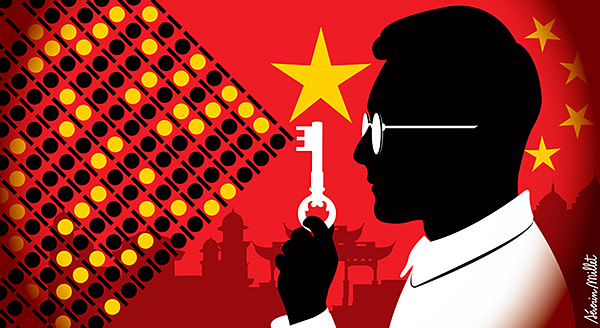‘Decoded’, by Mai Jia

Simply sign up to the Life & Arts myFT Digest -- delivered directly to your inbox.
Decoded, by Mai Jia, translated by Olivia Milburn, Allen Lane RRP£18.99/Farrar Straus & Giroux RRP$26, 320 pages
Mai Jia (the pen name of Jiang Benhu) is one of China’s most popular authors, but he is still practically unknown in the west; this, his bestselling 2002 debut Decoded, is the first of his novels to be translated into English. It’s tempting to think of him as China’s answer to John le Carré. Having worked professionally alongside spies and codebreakers in his country’s secret services, Mai now channels those experiences into fiction that combines literary sophistication with commercial appeal. And like le Carré’s Tinker Tailor Soldier Spy, Decoded has also been adapted for television and film.
There, however, the similarities would seem to end. Rong Jinzhen, the gifted cryptographer at the centre of Decoded, could not be more different from le Carré’s world-weary agent Smiley; and the only tinkering here is the author’s own, as he mischievously alters and reshapes the narrative. For this is a rather unconventional spy novel, full of metafictional twists and postmodern turns.
The book opens in the late 19th century, introducing Jinzhen through the stories of his ancestors, a family of salt merchants in southeast China. We learn that Jinzhen’s grandmother, Youying – known affectionately as “Abacus Head” on account of her freakishly large cranium – studied at Cambridge university before returning home, where she died in childbirth; her wastrel son, Jinzhen’s father, was stabbed to death by a local prostitute. (These early passages, marked by earthy imagery and somewhat cruel humour, have the flavour of Mo Yan’s tales of rural China.)
Born in the early 1930s, Jinzhen inherits Youying’s intelligence – and her oversized head. He is illegitimate and as a result rejected by his family; it falls to a local European expatriate, the kindly Mr Auslander, to raise him. Auslander is astonished at Jinzhen’s facility for numbers, and encourages the boy as he makes his first mathematical calculations. (With characteristically obsessive attention to narrative detail, Mai reproduces Jinzhen’s sums and formulas for the reader’s perusal.)
When Auslander falls ill, he convinces the family’s wealthy patriarch, Master Rong – who runs a university in the distant provincial capital – to take the boy in and fund his studies.
Reticent and socially awkward, Jinzhen is nevertheless welcomed by Master Rong and his wife and quickly recognised as a genius by the university’s professors, who urge him to follow an academic career. His life, though, takes a different course: after graduating in the 1950s he is strong-armed into “Unit 701”, a top-secret department of the new communist government, where his brilliant mind begins slowly to unravel.
Whisked off to an underground bunker in a remote mountain valley, Jinzhen’s talent is put to use in decoding transmissions from “X Country” (presumably Taiwan, home to the communists’ nationalist enemies). His career in cryptography starts brightly, and he is hailed as a hero for his work in cracking “Code Purple”, which had stumped his predecessors. But when Jinzhen is unable to unpick another, more fiendishly difficult, cipher, he sinks into despair, and feels the “dead hand” of insanity settling upon him.
After Jinzhen’s psychological collapse, he disappears from the narrative, and the narrator – ostensibly a journalist writing some 30 years later – begins to obtrude, declaring his intention to “challenge literary norms”. The rest of the novel breaks down into a jumble of fragments – snippets from notebooks; transcripts of unreliable interviews with Jinzhen’s former friends and colleagues – through which the reader must sift for clues as to his eventual fate.
In the hands of a lesser writer this sort of conceit might have been irritating but here it feels justified by the subject matter – we are encouraged to approach the narrative as a riddle to be solved, much like the ciphers that torment Jinzhen himself.
Similarly, Mai’s engagement with numbers, sustained throughout the novel, seems more than a mere gimmick. He manages to invest numbers with great emotional power; at times of stress his characters, both Jinzhen and those around him find reassurance in the order and symmetry of arithmetic. When Auslander dies, Jinzhen collects precisely 32,485 flowers to place in his casket, one for each day of his mentor’s life; later, when Jinzhen himself falls ill with renal failure, his adoptive mother measures out individual grains of salt before tenderly adding them to his meals.
Though we sympathise with Jinzhen at such moments, he remains a mysterious figure. One might see him as a victim of politics or history but there is no real social commentary here. Mai’s interest seems, rather, to lie in the impenetrability of the mind, and the difficulties of getting at the truth by way of literature. Mai has cited the influence of writers such as Borges and Nabokov – and there are shades of Herman Melville’s “Bartleby” in his pitiable, inscrutable protagonist.
Ultimately, however, Decoded seems an entirely original work – a mix of spy thriller, historical saga and mathematical puzzle that somehow coheres into a powerful whole.
Comments